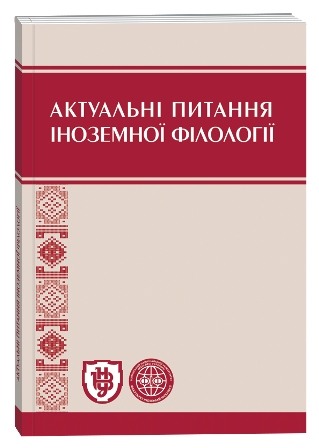THEMATIC GROUPS AS THE BASIS OF THE CONCEPTUAL CONTENT OF OSHO’S WORKS (INDIAN MYSTIC AND GURU OF NEOHINDUISM)
DOI:
https://doi.org/10.32782/2410-0927-2021-15-3Keywords:
thematic group, subject matter, lexical-semantic group, concept, conceptual contentAbstract
The article is devoted to the analysis of linguistic features of the works of Indian mystic and guru of neo-Hinduism – Bhagavan Sri Rajnish, known as Osho, namely – thematic groups in the works «A cup of tea» and «Seeds of wisdom». The purpose of our study is to identify thematic groups of words that will serve as a basis for conceptual content of the works. The achievements of Bhagavan Sri Rajnish have not been the subject of linguistic studies in our country or abroad, which determines the novelty of the study. The methodological basis of the work combines the principles of the cognitive-communicative paradigm of linguistics, which studies the intention of the author through language means, determines their cognitive-pragmatic and conceptual functions. Since the author is of the opinion that everything necessary for a full life can be found in everyday things, close to nature, that every person is happy since birth, the idea is reflected in text units, which are divided into several thematic groups. By thematic group we mean a set of words united by one function, which, in turn, are consistent with the concepts of the outside world. As a result, we distinguish the following thematic groups: words united by the meaning «obstacle to self-awareness»; words united by the meaning of «negative feelings»; words with the meaning of «perception through the senses»; words with the meaning of «natural phenomena», which, in turn, are divided into groups «celestial bodies», «weather phenomena» and a group with the meaning of «flora / fauna»; words united by the meaning of «positive feelings», words with the meaning of «awakening» and words with the meaning of «self-awareness». The thematic groups of words became the basis for the actualization of such concepts as OBSTACLES, NATURE, ENLIGHTENMENT and SELF. Studying the ways of implementing them in the text, pointing out pragmatic, cognitive and conceptual intentions of the author may be the prospects of the further research.
References
Ахманова О. С. Словарь лингвистических терминов. Москва : Сов. Энциклопедия. 1966. 606 с.
Васильев Л. М. Теория семантических полей. Вопросы языкознания. 1971. № 5. С. 105–113.
Ганич І. Д., Олійник І. С. Словник лінгвістичних термінів. Київ : Вища шк. 1985. 360 с.
Жиртуєва Н. С. Проблема «Просвітлення» у вченнях неоіндуїзму. Мультиверсум. Філософський альманах. Київ. Центр духовної культури. 2006. № 56. URL: http://www.filosof.com.ua/Jornel/M_56/Zhyrtujeva.htm
Козак Л. В. Українська електротехнічна термінологія (словотвірний аспект) : автореф. дис. на здобуття наук. ступеня канд. філол. наук: 10.02.01 «Українська мова». Київ, 2002. 19 с.
Колган О. Явище синонімії в термінології гірництва. Вісник Нац. ун-ту «Львівська політехніка». Серія «Проблеми української термінології». 2009. № 648. С. 82–87.
Лисиченко Л. А. Лексико-семантична система української мови. Харків. Харківський держ. пед. ун-т ім. Г. С. Сковороди. 1997. 131 с.
Микульчик Р. Б. Тематична класифікація фізичних термінів-епонімів. Вісн. Нац. ун-ту «Львів. політехніка». 2016. № 842. С. 92–95.
Ракшанова Г. Ф. Система дериваційних засобів сучасної науково-технічної термінології (когнітивно-номінативний аспект) : автореф. дис. канд. філол. наук: 10.02.01. Київ. 2004. 20 с.
Симоненко Л. О. Біологічна термінологія : формування та функціонування : навч. посіб. Умань, 2006. 103 с.
Соколовская Ж. П. Система в лексической семантике (анализ семантической структуры слова). Київ, 1979. 192 с.
Филин Ф. П. Очерки по теории языкознания. Москва, 1982. 410 с.
Шмелев Д. Н. Проблемы семантического анализа лексики : уч. пособ. для студ. высш. уч. завед. Москва, 1973. 280 с.
Яценко Н. О. Назви військової форми одягу в українській мові : автореф. дис. канд. філол. наук. Київ. 2007. 20 с.
Osho. A cup of tea. 1971. URL: https://www.oshorajneesh.com/download/osho-books/hindi-translations/A_Cup_of_Tea.pdf
Osho. Seeds of wisdom. 1994. URL: http://www.alaalsayid.com/ebooks/OSHO%20pdf/Seeds%20of%20Wisdom.pdf
Weissgerber L. Grundzüge der inhaltsbezogenen Grammatik. Düsseldorf. 1962. 480 s.







